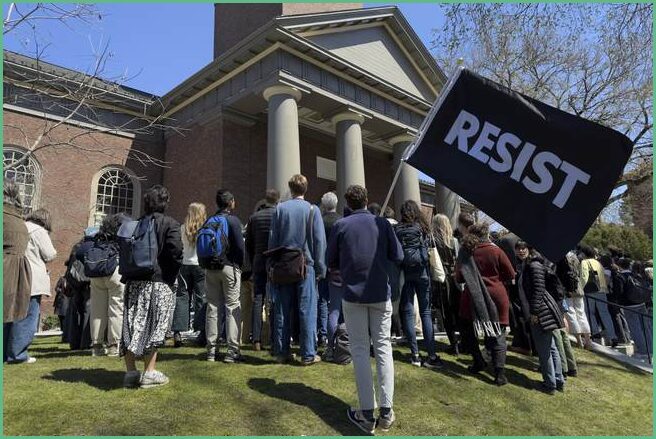Something ugly unfolded in Brookline, Massachusetts that demands straight talk. A visiting Harvard professor allegedly fired a pellet gun near a synagogue just as Yom Kippur began, and the timing makes this more than a local disturbance. The story raises real questions about motive, accountability, and how elite institutions respond when incidents touch on religious communities.
Authorities say the man involved is Carlos Portugal Gouvea, 43, a Harvard Law School alumnus and a current associate professor at the University of São Paulo Law School. He was arrested after witnesses reported two loud shots outside Temple Beth Zion and private security confronted him. According to reports, he later told officers he was “hunting rats.”
That explanation is thin, and it smells wrong to anyone paying attention to context and timing. Firing a pellet gun in a populated neighborhood, near a house of worship on the holiest day in the Jewish calendar, cannot be shrugged off as an innocent coincidence. Whether it was meant to intimidate or was reckless negligence, it is dangerous and unacceptable.
Why this matters
Harvard reportedly placed Gouvea on administrative leave, which is the least they can do while the facts are sorted. But actions speak louder than memos and spin; the university must show it protects religious minorities and enforces standards evenly. Too many institutions offer vague statements instead of firm consequences, and that lack of clarity erodes trust.
Brookline police charged Gouvea with illegally discharging a pellet gun, disorderly conduct, disturbing the peace, and malicious damage to personal property, according to court filings. He appeared in Brookline District Court, pled not guilty, and was released on his own recognizance with a November return date. The criminal process will run its course, and the public deserves transparency about how investigators reached their conclusions.
Carlos Portugal Gouvea, 43, was arrested Wednesday night after police said he fired two shots near Temple Beth Zion on Beacon Street in what he later claimed was “hunting rats,” Brookline.News reported.
Investigators do not believe that Gouvea was targeting the synagogue, but he was charged in Brookline District Court with illegally discharging a pellet gun, disorderly conduct, disturbing the peace and malicious damage of personal property, according to court records.
…
Two private security guards working at the synagogue reportedly confronted him after hearing “two loud shots” and spotting him holding a pellet rifle.
When the guards approached, Gouvea allegedly set down the gun before a “brief physical struggle” broke out as they tried to detain him, the outlet reported, citing a police account.
Police said Gouvea then ran into his nearby residence before emerging moments later, where he was handcuffed and arrested. Officers later discovered a shattered car window and a pellet lodged inside the vehicle, according to the police report cited by Brookline.News.
The details in that excerpt are troubling on their face: two shots, a set-down rifle, a brief scuffle, a shattered car window with a pellet lodged inside. Those are not the ingredients of an innocent neighborly moment. Even if investigators say the synagogue was not targeted, the evidence begs for a full, public accounting of how that conclusion was reached.
Camouflaging seriousness with bureaucratic language does no one any favors, least of all the community shaken by an apparent attack near a house of worship. The Jewish community deserves protection and clarity, not equivocation. Universities and law enforcement both have to answer for how they treat threats that intersect with vulnerable communities.
There is also a pattern to watch. Harvard and other campuses have faced repeated controversies over antisemitism, free speech, and disciplinary consistency in recent years. Republicans have long argued that elite institutions often wink at behavior that escalates into physical threats when it comes from certain ideological corners. That perception fuels cynicism and makes fair, transparent handling of incidents even more critical.
Accountability means more than a temporary leave or an internal review that never sees the light of day. If misconduct or a bias motive is uncovered, there should be clear consequences that reflect the severity of the conduct. If this was reckless stupidity, treat it as such; if it was targeted intimidation, prosecute it to the full extent of the law.
Communities have a right to demand better: better policing of dangerous behavior, better campus discipline, and better public answers. The First Amendment protects speech, but it does not protect violent acts or threats, and it certainly does not protect actions that terrorize worshippers. Leaders who pretend otherwise are failing their constituents.
